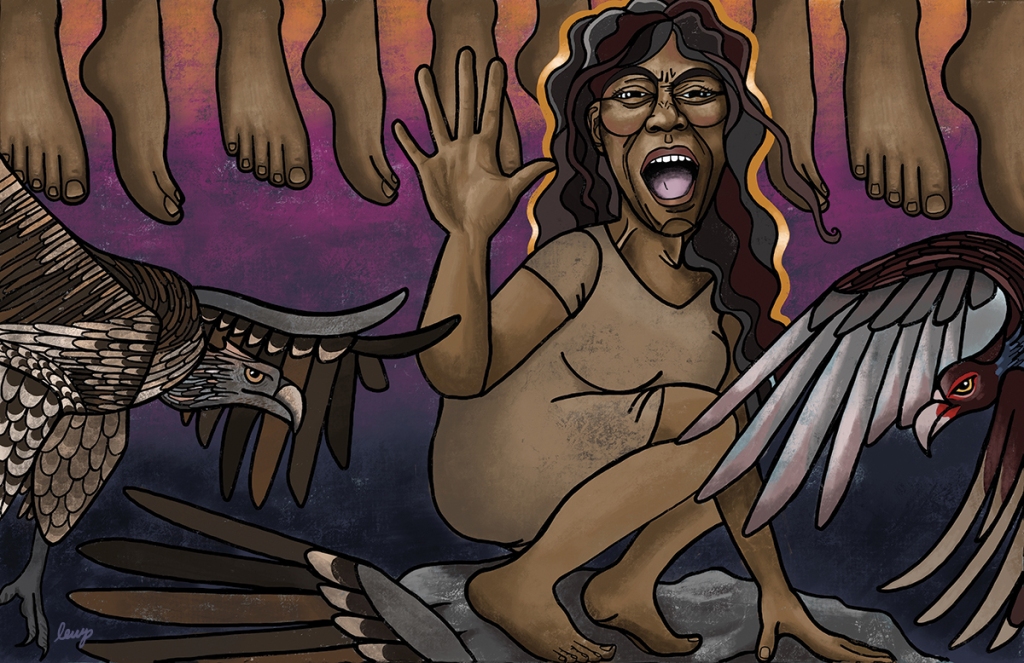
a reflection on Luke 19:1-10
I wonder how our friend Zaccheus, in his later years, might have told the story of this remarkable day. I wonder if he spent all the rest of his days trying to find words that would capture the delight and astonishment he felt at being seen up there in that tree and singled out by Jesus. Surely his neighbors found themselves telling this story for many years to come. And I am pretty sure that Zaccheus himself was as surprised as anyone by this turn of events. Zaccheus the tax collector: a man who had grown accustomed to being defined by his job; a man who had grown accustomed to being boxed into a category, his uniqueness overshadowed by his social position. Surely, no one is more surprised than Zaccheus himself when Jesus sees him up in that tree and calls him out for a great and unexpected honor.
What is it that Jesus sees in Zaccheus? What potential does Jesus see in this man that others have failed to notice? Somehow, Jesus looks up into that tree and sees this man whole. Somehow, Jesus is able to see beneath the surface of Zaccheus’ life; to look beyond his reputation and his job and see who Zaccheus really is: a unique, irreplaceable child of God. And in that instant, when Zaccheus is truly seen, maybe for the first time, everything unravels for him. Everything he once knew about himself, about his job, about his neighbors’ opinions of him — all of this unravels when he is seen. In that instant, Zaccheus’ old identity falls away, and the truth of his essential self — the self he was created to be — comes down out of the tree for all to see.
This season, as so many of our own identities, customs, and communal practices are unraveling around us, we are looking to our ancient stories for wisdom and support. Here in our ancient texts, we encounter characters who, just like us, find that when their own lives and roles begin to unravel, that very unraveling makes room for God to work in and among them in new and surprising ways.
If you want to see the surprise and delight on Zaccheus’ face, I think you’ll find both in the painting by Hannah Garrity that depicts today’s gospel story. In this work of creative imagination, the painter invites us to notice how Zaccheus’ face lights up as he sees his true self reflected in Jesus’ loving eyes. And as this painter reflects on the healing power of being seen, she discovers a connection to her own work as a middle school teacher. Here is Hannah Garrity’s own reflection on what happens when her students feel truly seen:
I teach middle school art. I have spent this school year testing the waters. Each day I try a new collection of inputs for various situations. The most effective one is to stop in at every single student’s seat to have a personal conversation with them. In these conversations, I reiterate the assignment, glean information about what the student plans to do, and answer any questions. The byproduct is positive productivity. Is it because I’ve shown that I care? Is it because I’ve clarified the expectations? Is it because I simply acknowledged their existence in the room? Is it because I saw them? -Hannah Garrity
As I read this teacher’s reflections on the power of being seen, I find myself wondering what her students would say about what happens to them in Ms. Garrity’s classroom. I wonder if, like Zaccheus, they are even now searching for words to describe how it feels to have someone really see them and hear them, not just as a category (“tax collector,” “middle schooler”) but as a unique and uniquely gifted individual.
If you’ve been worshipping with us for a while, you’ll know that here at First Congregational Church, on the first Sunday of the month, we celebrate all-ages worship, keeping our children with us for the entire worship service. It’s part of a very intentional practice in which we create a community where children are seen, and heard, and welcomed as the unique individuals that they are. And I believe that there is no more important work for any church community than to create a place where trusted adults practice seeing every child in their wholeness. A community in which trusted adults see and name and reflect back to our children the unique gifts that each one brings to the world.
Beloved, as we worship in many different places this first Sunday of the month, I am acutely aware of the fact that our children are sorely missing the weekly gift of seeing and being seen by us. And as we make our way toward the start of the school year, I am praying daily for the teachers and school administrators who are working long hours right now to reimagine what school will look like this fall, in the midst of a global pandemic. I hope you will join me in grateful and loving prayer for all the teachers and educators right here in Salem and all around the country, as they imagine and create so many different kinds of educational experiences for students who have a great diversity of needs.
And, of course, I am praying for parents who may need to decide, very soon, whether returning to school will be the right choice for their children, all of whom have unique and individual health needs, social needs, and educational needs.
I’d like to suggest that in addition to our prayers, we might also help our parents, teachers, and kids by making a commitment this season to see our children whole. To see them as Jesus sees Zaccheus this day, as the particular souls that they are, each with their own unique gifts to bring to the world. Of course, some of us aren’t able to physically be with the children in our lives in person right now. But what if we can still see them from afar, by really recognizing their essential selves, their unique and irreplaceable gifts and needs? What if our own clear seeing of the children we love might help their parents make crucial choices this season about what is best for their particular children? Whatever else happens in the weeks ahead, there will be new choices to make. Will school be online or in person, or a combination of both? Do I send my children back to school, or would they be safer right now learning at home? And if this child is staying at home, what kind of learning would be best for this unique being who has been entrusted to my care? These are sacred questions, friends. Questions that will help us all, in the months and years ahead, to nurture the souls of all the children in our care and in our communities.
Over the past few weeks, I have been pondering all these questions with my friend Meredith, who has spent much of her professional life thinking about how to meet the learning needs of children and youth. In the past few weeks, she has created a list of questions that might help us all see the children in our lives more clearly, and help us make decisions about the school year ahead. I want to share these questions with you here, in hopes that you will share them with anyone in your life who is making important decisions about their children’s schooling right now. Whether or not you are involved in making decisions about the school year ahead, I invite you to prayerfully consider these questions, because I believe they are the kinds of questions that can help us see all our children whole…
- What does your child miss about school? What does she not miss?
- What do you miss from when your child was in school? What are you relieved to be rid of?
- Is there anything that has become possible that was not possible before?
- Is there anything your child has been interested in that there has never been time to explore with them?
- What is helpful for your child to have in his days?
- What is important to him?
- How much physical activity does your child need?
- How is your child different from you? What do you admire about them?
As Meredith points out, you can consider these questions yourself, and perhaps also invite your child to ponder them as well. This would be fertile ground indeed for conversation with the children in your life. If you’d like to read more about this process of reflection, you can read the full article, “Finding What Matters,” here: https://meredithcollins.link/2020/07/27/findingwhatmatters/
Beloved, I wonder if there is a child in your life who is spending these long summer days in the branches of a tree? What secrets might that tree be whispering to her tree-loving soul? Or maybe, even as you read this, there is a child who is busy wrapping your sofa in kitchen twine. What kind of beauty might his unique artist’s soul be longing to offer the world?
As we make our way from summer into fall, may we watch and listen for who God is calling each of our children to be. May all our children be seen, and known, and abundantly loved into the fullness of their own beautiful souls. Amen.


